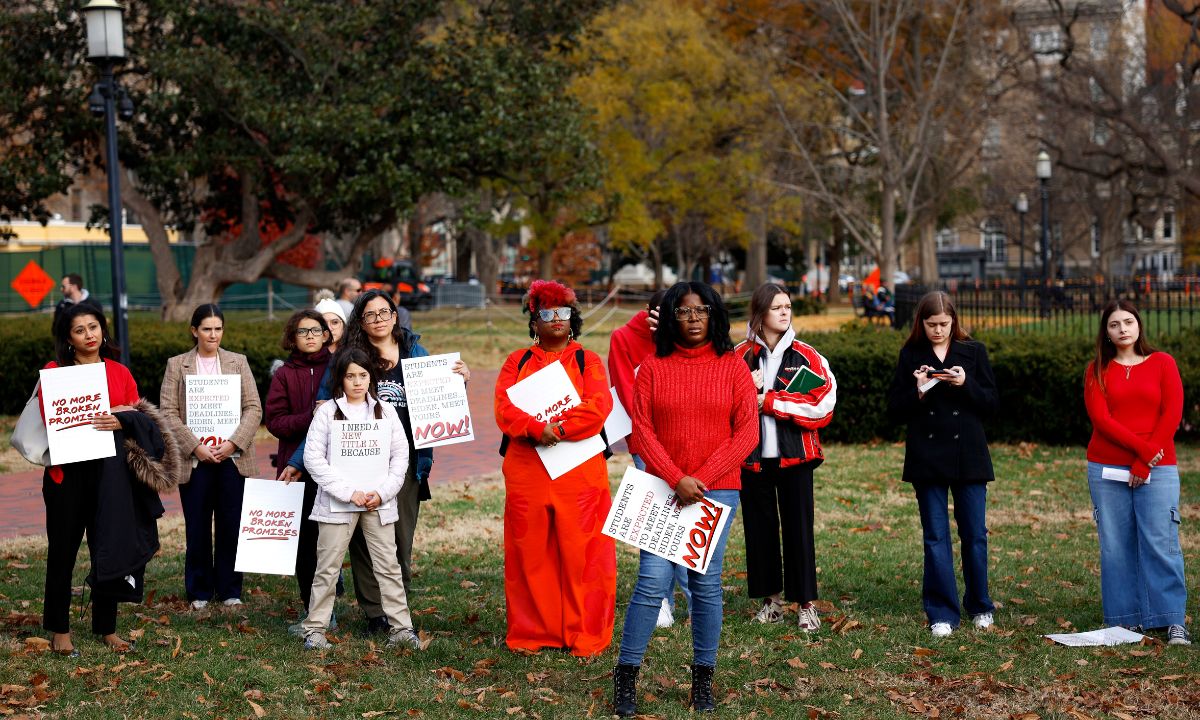As DOE and Title IX Are Dismantled, The Promise of Equal Opportunity Is at Risk
Batté: The Trump administration has set the stage for a future in which women and survivors of sexual violence will be left even more vulnerable.

Get stories like this delivered straight to your inbox. Sign up for The 74 Newsletter
As Secretary Linda McMahon works to shutter the U.S. Department of Education and the Trump administration returns to its 2020 Title IX regulations, gender equity in education could suffer a permanent and detrimental blow. In nearly six months, President Donald Trump’s second term has already set the stage for a future in which students — particularly women and survivors of sexual violence — will be left even more vulnerable.
Beyond promoting equal opportunity in academics, sports, and extracurricular activities, Title IX is designed to uphold protections for those who experience sexual harassment and assault. However, the return to Trump’s 2020 Title IX rule is a significant setback in progress and will put these students at much higher risk.
Now, survivors will again face difficult barriers coming forward because of burdensome standards of proof and a limited scope of what constitutes sexual harassment and assault. Schools will also have less authority to conduct thorough and prompt investigations of complaints, leaving survivors with fewer options and less support, further discouraging reporting and perpetuating a culture of silence on campuses.
Compounding these concerns, the U.S. Department of Energy has recently taken significant steps to roll back certain Title IX regulations aimed at combating sex discrimination in education programs and sports. This move includes rescinding rules that encourage educational institutions to address gender disparities, particularly in STEM fields, where women remain underrepresented.
Simply put, Trump’s second term has moved beyond a repeat of his 2020 changes. The radical act of dismantling the Education Department, or stripping its Office of Civil Rights, would endanger the remaining scope of Title IX by making it harder to hold educational institutions accountable for fostering environments where women can learn and thrive free from discrimination or violence.
Without federal oversight, schools’ compliance with Title IX would go unmonitored, resulting in a system in which institutions may be allowed or emboldened to violate the law. Alone, many state and local education agencies lack the resources, expertise, or political will to adequately enforce Title IX’s protections. Women and girls would see the loss of critical resources designed to combat discrimination and violence, while also encountering barriers to full participation in sports and extracurricular activities.
The administration’s cuts and policy shifts deliberately affect women and other students from marginalized groups, including LGBTQ students and those from ethnic and racial minorities, who also rely on the protections afforded by Title IX to ensure access to a fair and equal education.
Beyond reverting to outdated, harmful regulations, the administration has sent a message that addressing gender discrimination and violence is no longer a priority for our country’s educational system. In a time when gender-based violence is a pervasive issue, dismantling the safeguards that were designed to protect students is not just short-sighted, it is dangerous.
Without institutional accountability for addressing sexual harassment, assault, and discrimination, survivors may experience long-term trauma, academic setbacks, or even drop out — disrupting educational and career trajectories.
Likewise, the Department of Energy’s proposed changes would not only weaken the foundation for equal participation in federally funded programs but also signal a broader federal retreat from enforcing civil rights in education. These rollbacks bypass traditional public notice and comment periods, raising questions about their legality and transparency.
The consequences are stark: fewer opportunities for women and marginalized groups in education and athletics, and a diminished federal commitment to combating sex discrimination in areas critical to career development and economic equality.
Discrimination in education frequently leads to fewer opportunities to pursue high-paying jobs, deepening gender and racial wage gaps over time. Furthermore, when these behaviors are accepted in schools, they can carry over into professional settings, perpetuating harmful work environments.
The path forward requires reinstating and strengthening the protections enshrined in Title IX, particularly to recenter survivors. We also need a DOE that ensures schools not only comply with the law, but also emphasize justice, fairness, and support.
Get stories like these delivered straight to your inbox. Sign up for The 74 Newsletter

;)
